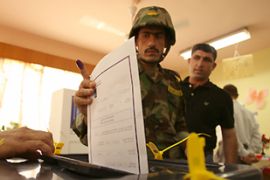Iraq’s Kurds set for key vote
Presidential and legislative polls take place on Saturday amid tensions with Baghdad.

More than 2.5 million Kurds are eligible to vote.
| In depth |
|
|
For the first time the regional president will be elected by popular vote in Iraqi Kurdistan, which covers the provinces of Arbil, Dohuk and Sulaimaniyah and has its own flag, national anthem and national day.
Reporting from Irbil in northern Iraq, Al Jazeera’s Hoda Abdel-Hamid said it had been a very competitive electoral campaign.
“It has had a lot of resonance. A lot of people in Kurdistan call this the first real election.
“People for the first time are talking really about domestic Kurdish issues.”
Barzani has said he will not “compromise” on the long-standing claims to Kirkuk and wants the issue to be settled by a referendum called for under the Iraqi constitution, despite opposition from Arabs and Turkmen.
Growing tensions
During the US-led invasion of 2003, Kurdish peshmerga fighters who had fought the regime of Saddam Hussein, occupied many of the disputed areas.
The former rebels are now deployed alongside Iraqi army soldiers, triggering tensions that have raised the prospect of armed conflict.
Tensions over the region’s oil wealth have also risen, after the Kurdish administration began exporting oil for the first time at the start of June. Baghdad disputes the region’s right to sign contracts without central government approval.
During a visit to Washington on Thursday, Nuri al-Maliki, the Iraqi prime minister, acknowledged that serious internal differences existed.
However, he said he was “confident that we will be able to resolve all these issues not only with the Kurdistan region but also with other provinces”.
“Major challenges”
Sammy Shourash, the former Kurdish culture minister, said: “The next government will have major challenges to face.
“The most pressing of those is resolution of the territorial and constitutional conflict with the central government in Baghdad.”
|
“The next government will have major challenges to face” Sammy Shourash, former Kurdish culture minister |
Kurds are also increasingly concerned about corruption, with many voicing support for change after decades of PUK and KDP dominance.
Independent candidates like Nusherwan Mustafa, a wealthy entrepreneur and former PUK deputy leader, are working to break the PUK-KDP dominance.
“We think that Kurdish society, after a political stabilisation, now needs economic, social and cultural reforms,” Mustafa said.
Political ‘malpractice’
But Dr Fereydun Rafiq Hilmi, a member of the first Kurdish cabinet in 1992, suggested that the election is unlikely to undermine the ruling alliance between the two parties.
“I don’t think there is going to be any challenge to the PUK and KDP, because these guys are there to stay. They have no intention of letting anyone else rule,” he told Al Jazeera.
Hilmi said the parties have “a long list of malpractice as far as elections are concerned”, citing the first Kurdish elections in 1992 in which he says the results were “discarded”.
“They decided to have a 50-50 system and they established a government, of which I was a member. It was quite ineffective,” he said.
“The people are fed up with the old way of doing things. They have been fed up for the past 18 to 19 years.”

